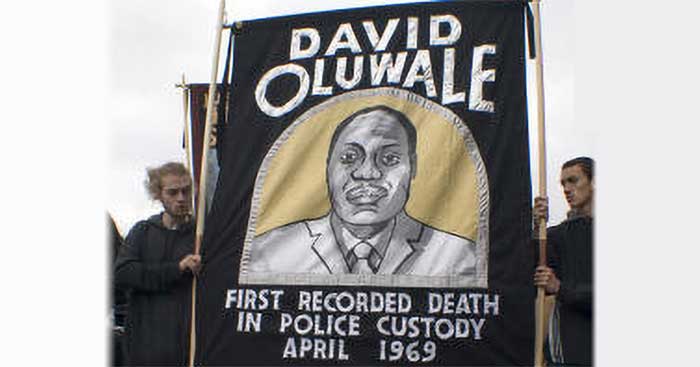

Photo: Banner in honour of David Oluwale at United Friends & Families Rally 2005, Credit 4WardEver UK
David Oluwale was hounded to his death by officers from Milgarth Police Station, Leeds in 1969. Though initially not treated as suspicious by the police or coroner, in 1970 an investigation into his death sparked a public outcry and the first successful prosecution of police officers for involvement in the death of a black person.
Oluwale was a British Nigerian who travelled from Lagos to Hull in 1949, where despite having the right to live in Britain, he was arrested for hiding aboard the ship and served 20 days in prison. He encountered the police again in 1953, caught up in a night club raid and sentenced for 28 days for disorderly conduct and assault. In prison, it was reported he suffered from hallucinations. While these were possibly the result of a truncheon blow during his arrest, Oluwale spent the next eight years in Menston Asylum.
As a black man in 1950s Britain and deeply affected by his incarceration, he found it impossible to find housing or work upon his release. He spent the remainder of his life homeless, harassed and abused by the police.
In the inquiry following Oluwale’s death, it was found that Leeds police – particularly Kenneth Kitching and Geoffrey Ellerker – regularly beat him up, degraded and racially abused him and tried to force him to leave the city.
On the morning of 17 April 1969, two officers were seen chasing Oluwale towards the river Aire, where his drowned corpse was discovered two weeks later. However, neither the police nor the coroner treated his death as suspicious.
The story of Ouwale’s death only came to light thanks to a whistleblower in October 1970 – when Ellerker was serving a prison sentence for a cover up in an unrelated murder case. On this very rare occasion, and likely as a result of his prior conviction, the police broke ranks and Ellerker and Kitching’s treatment of Oluwale was investigated by Scotland Yard.
The trial, however, was a whitewash. The judge referred to Oluwale as a “dirty, filthy, violent vagrant” and witnesses who made statements to the contrary – including Yorkshire Evening Post reporter Tony Harney – were not heard from in the trial. The prosecution made no mention of racism, despite clear evidence that this motivated the officers. It was also demonstrated a far wider group of officers had participated and colluded in the hounding of David Oluwale than the two on trial.
Despite the catalogue of physical and verbal abuse and the evidence of two independent witnesses who saw uniformed police chasing Oluwale toward the river, the judge instructed the jury to find Ellerker and Kitching not guilty of manslaughter, perjury and grievous bodily harm. Both were found guilty only of actual bodily harm and Ellerker sentenced for 3 years and Kitching for 27 months.
Fifty years have passed but we see this same story repeated today in the US and UK. Of the three men who murdered Breonna Taylor only one has been charged, and not for taking her life but for endangering her neighbours in the wild volley on gunfire that killed her. The last successful conviction of a police officer in the UK for a death in custody was in 1971, and even then, the officers were found guilty of assault, not murder or manslaughter. Since 1990, there have been 1,755 deaths in police custody with black people twice as likely as white people to suffer this fate. Yet no UK police officer has every been found guilty of the murder or manslaughter of someone in their custody.
In 1970, the Oluwale case exposed the institutional racism of the police and today the Black Lives Matter movement is protesting that very same racism and violence. An institution, charged with policing the lives of black people in an institutionally racist society, will always be an instrument of racism.
While we must fight to limit the powers of the police force and impose community-led, independent inquiries into police violence and murder, we must recognise that the capitalist state and its instruments of coercion – the police, judiciary, and military – cannot be peacefully reformed, but must be dissolved and replaced by workers’ democracy and self-defence in the course of the socialist revolution.
For further information about the life and death of David Oluwale: The Hounding of David Oluwale by Kester Aspden and the Remembering Oluwale anthology.